Matt Rees's Blog - Posts Tagged "tel-aviv"
Coffee cultures of Israelis, Palestinians...and Hawaiians
 I have a lot of good reasons for staying in the Middle East as long as I have. I admit the main thing keeping me here 14 years and counting may really be inertia, but I also relish being an outsider, researching my Palestinian crime novels on site, visiting the Palestinian towns whose atmosphere of violence, decay and liveliness makes me feel so creative.
I have a lot of good reasons for staying in the Middle East as long as I have. I admit the main thing keeping me here 14 years and counting may really be inertia, but I also relish being an outsider, researching my Palestinian crime novels on site, visiting the Palestinian towns whose atmosphere of violence, decay and liveliness makes me feel so creative.Still, let’s get real: I’m here for the coffee.
There’s no place outside Italy where there’s a more sophisticated coffee culture than Israel, and nowhere on earth do you find yourself cajoled into drinking as much coffee as Palestine.
When I first arrived here, Israelis were drinking one of two kinds of execrable coffees. Middle-aged ladies seemed to go for “Nes,” which despite being the Hebrew word for “miracle” signified only that it was Nescafe instant, served with water so hot that it’d be a miracle if you could taste anything and with enough milk to make it look about the same shade as the skin of the sun-loving ladies who drank it. The alternative was “botz,” which is the Hebrew word for mud. To sum that up: why drink the liquid when you can also have the grounds stuck between your teeth for an hour or two?
In the last decade, however, the number of cafes – hip and less so – in Israel has risen sharply. Everywhere you go, even in Jerusalem and let alone in trendy Tel Aviv, there are bars offering top international brands from the ubiquitous Lavazza to Caffe Mauro and Bristot. It’s an Italian-style espresso-drinking culture and in some of the cafes they even understand how to maintain their espresso machines, thus guaranteeing a good cup.
See, at least there’s one thing about Israel which hasn’t gone to hell in a handbasket over the last decade. Don’t let anyone say I don’t look on the bright side.
Palestinians haven’t changed their style, however. (Which now that I think of it is also a good reflection of their role in the so-called peace negotiations over the past decade.) The way most of them like their coffee is cooked in a narrow-topped tin pan, boiling it over a gas flame with some sugar. “Masbuta,” or “just right,” for coffee with some sugar. “Sada,” or “bitter,” for funerals – and of course for Omar Yussef, the hero of my crime novels.
When in Palestinian towns, you’re greeted at every meeting by a small cup of thick coffee. You have to wait for the grounds to settle and then drink it before you can move beyond the small talk and get down to business. Every meeting, all day. Until you’re buzzing and wondering why all the colors are so bright, even though you’re inside and the shades are drawn. You’re also curious about the stabbing pains in your urethra….
Not that I only have coffee when I go out. Four years ago I quit journalism to work from home on my fiction. I get a monthly delivery of Lavazza for my home machine. It comes straight from the importer. Perhaps it’s the quantity I consume, but they seem to believe they’re delivering to a business address. Naturally I tell them I have an extensive staff, each of whom needs a lot of coffee, and that’s why they need to make an extra delivery again this month…
So with coffee being that central to my existence here, I was particularly intrigued to hear from a reader of my novels – and of this blog – named Terry Fitzgerald. TF informed me that my fellow blogger and terrific author of Bangkok crime novels Christopher G. Moore had signaled his approval of Terry’s Da’kine Coffee Bean, which he produces in Honaunau, Hawaii. He kindly offered to send me along a batch.
Now I used to be a journalist – when someone offers me something free, I’ll go to extraordinary lengths to secure it. In this case, I made several visits to my local branch of the Israeli Postal Service whence I eventually was able to wrest a bag of Terry’s prize-winning bean. (Check him out).
I’ve offered Da’kine to some Israeli friends, who commented with pleasure on its redolence of the most deliciously bitter of dark chocolate. I took it into Bethlehem for a rendez-vous with the real Omar Yussef. He drank it without sugar and with approval. As is traditional for a Palestinian when accepting a coffee, he said: “May Allah bless your hands. May there always be coffee in your home.”
This brand, too, I hope.
(I posted this on International Crime Authors Reality Check, a joint blog for me and three other authors of -- obviously -- international crime novels. Take a look.)
Published on March 03, 2010 23:03
•
Tags:
arab-coffee, blogs, botz, bristot, caffe-mauro, christopher-g-moore, coffee, da-kine-coffee-bean, espresso, hawaii, hawaiian, honaunau, israel, israeli, jerusalem, lavazza, masbuta, middle-east, nescafe, omar-yussef, palestine, palestinian, sada, tel-aviv, terry-fitzgerald
Back to Israel: Recall what's foreign
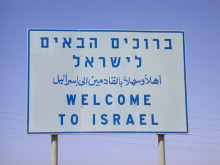 When you live in a foreign place, it can become home. You forget how foreign it is.
When you live in a foreign place, it can become home. You forget how foreign it is.Then you go to another foreign country, only to discover that it doesn’t seem so foreign. And you realize that the place you live actually IS extremely foreign.
That’s what happened to me during the last week, when I toured Germany to read from my third Palestinian rime novel THE SAMARITAN’S SECRET (just published by CH Beck Verlag as “Der Tote von Nablus.”)
I was in Munich station when I noticed in a pastry shop that Germans spell pretzel with a B (“Brezel”). I felt a little blown away, as though I’d been living a lie all these years offering my son “pretzels.” But that’s as foreign as Germany got. Otherwise, this Welshman felt right at home there.
Right off the plane on my return to Israel, however, the country which has been my home since 1996 and where I’ve grown accustomed to the way people behave, the foreignness hit me anew.
Actually even before that. The fellow in the seat next to me on the flight from Frankfurt kept talking to me – Israelis have a way of talking a lot and they can also be rather clueless about my oh-so-subtle signals that I’d rather read my book. While I was eating, he reached over and took part of my bread roll with a smile and gentle touch of my forearm. (Bread is something you share in Middle Eastern meals, although it usually applies to pita and flatbread, not to tiny airline rolls. This was pretty extreme space-invasion, even for a Middle Easterner, but the reassuring friendly gestures while he was taking advantage of me were very familiar.)
Then in the airport, the dimensions of personal space shrank from the yard kept by Germans to an elbow-brushing, back-nudging Middle Eastern minimum. I smiled, because the Tel Aviv airport is very flashy and new – you could be anywhere in the world. But it’s most definitely not the unflustered calm of Dresden airport, where I boarded my first flight of the day.
Arrival in a “foreign” country means a lot of things that’ll sound deeply negative – or at least they’ll sound like I’m being negative. The shoving and noise and the passport lines where people don’t actually wait in line but prefer to edge around you. But I’m not entirely negative about them. I like it (mostly), because I enjoy being an outsider. To be sure, I don’t think I’d like it much if I looked around and thought, “These are my people. This is my culture. This is ME.”
Then, I expect I’d want us to be more organized, more respectful of each other, less suspicious, more…foreign.
As I emerged into the humidity of the plains between Tel Aviv and the Judean Hills, it struck me that “foreign” countries are simply the ones where things aren’t even remotely fair. That’s why everyone at the Tel Aviv airport hovers over the baggage carousel, shifting from foot to foot, edging in front of others closer to the bags. It suggests an absolute fear that the bag never will come and, most of all, that if all the bags happened to arrive all at once you must be the first one to grab yours and get away before the other suckers. Life in a “foreign” country is a zero-sum game, in which someone else’s success or happiness comes somehow at your expense and must be envied, hated, usurped.
That’s not a German quality. Germans have a sense that there’s some degree of fairness in their society and it makes relations between them less devious and Machiavellian, less on the make. They drive fast, but they don’t think someone else driving fast is attacking them on a macho level, signaling superiority and disdain for them, and, thus, respond by semi-subliminally trying to run them off the road.
So here I am, back in Jerusalem, back to being a foreigner.
Though I shouldn’t forget that at least Israelis spell pretzel with a P.
(I posted this on International Crime Authors Reality Check, a joint blog I do with some other crime writers. Check it out.)
Published on March 25, 2010 07:35
•
Tags:
blogs, crime-fiction, der-tote-von-nablus, dresden, frankfurt, germany, israel, israelis, jerusalem, middle-east, munich, tel-aviv, the-samaritan-s-secret
Israeli settler sect: Messiah is coming
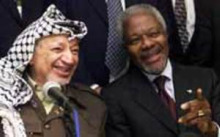 GIVAT ONAN, West Bank—On this windblown outpost in the hills north of Jerusalem, a small group of Israeli settlers strives to bring the day of redemption promised, as they believe, in the Bible.
GIVAT ONAN, West Bank—On this windblown outpost in the hills north of Jerusalem, a small group of Israeli settlers strives to bring the day of redemption promised, as they believe, in the Bible.A controversial sect shunned by nearby Israeli settlements, the Brothers of Onan believe that by “spilling their seed” on the land of the ancient biblical Jewish homeland, they will hasten the coming of the Messiah. With the Israeli communities of the West Bank considered illegal under international law, the Onanists are the outcasts among outcasts. But they’re unperturbed.
“We can never give up this land,” says the group’s leader, Rabbi Meir Gedalia Kaplowitz. “You can ejaculate all you want in Tel Aviv or New York, but the Holy One, blessed be He, wants us to perform the miracle here.”
Kaplowitz sits in a messy caravan on a windy hilltop, taking a brief break from his endless routine of Talmud study and self-abuse. Wild-eyed and gaunt, he is the picture of the stereotypical Israeli settler extremist. Only, if anything, even more wild-eyed and gaunt.
The sect takes its name from the biblical Onan, who was ordered by his father Judah to impregnate Tamar, his brother’s widow, and to pass off the resulting children as belonging to his deceased brother. Not wanting to have children he couldn’t regard as his own, Onan fornicated with Tamar but at the moment of ejaculation he “spilled his seed.” God punished this disobedience by killing Onan.
Onanism has become a term used to describe such coitus interruptus, though it is also used for masturbation. In the Hebrew spoken on Givat Onan, masturbation is “onanut.”
“We’re proud to use that word for what we do,” says Haim Hercz, who occupies the caravan next to Kaplowicz. “But it's not all about Onan. Sometimes we call it flogging the Pharisee or chafing the camel. We have a sense of humor, just like people who have sex with women. But anyone can do that five or six times a day. We know that what we’re doing has a deeper purpose, and that’s what keeps us going.”
The Brothers of Onan celebrated Passover with a traditional Orthodox seder meal this week. (“Frankly it was nice to have something else to keep us occupied for six hours,” says Hercz.) But next week they plan to take their struggle to Tel Aviv, where they will pray and “shoot their short Uzis” outside the Israeli Defense Ministry to protest any restrictions on building in the settlements.
Successive Israeli governments have justified new construction in the West Bank by arguing that they are only satisfying “natural growth,” whereby the growing families of settlers must be accommodated with new homes. “Obviously that’s not fair on us,” says Kaplowitz.
Israelis who oppose the settlements say the Brothers of Onan are more than a dangerous fringe group. Orla Mohel, a Tel Aviv masseuse, founded Wank Watch to combat the influence of the group. “I’m concerned that a lot of people in Tel Aviv will see them as harmless ‘frotteurs,’” she says. “But they celebrate a story from Genesis in which a father forces a brother to have sex with his sister-in-law, tries to get a third son to marry her, then has sex with her himself.”
Harvard Law School professor Alan Dershowitz writes in his book “The Genesis of Justice” that Onan probably had non-penetrative sex with Tamar, or maybe anal sex.
“I didn’t go to Harvard and I’m not a lawyer, so I'm no expert on the Bible or anal sex,” responds Mohel. “But these Onanists also don’t want to give up the West Bank, which prevents a peace deal.”
Rabbi Kaplowitz contends that he’s no extremist. Rather he claims to represent the mainstream in Israel. “There are only a couple of dozen of us here, but there are thousands of others who’d like to join us. We’re out here in the lonely desert hills, doing something important for the redemption of the world. It’s not easy. We have very slow internet and sometimes youporn.com goes down for minutes at a time. Our thing is exhausting without visual aids.”
US Mideast envoy George Mitchell has condemned the Givat Onan outpost as “illegal under international law and pretty skeezy.” Mitchell also cited the 4th Century sage St. Athanasius of Paros as saying that “to have coitus other than to procreate is to do injury to nature.”
Kaplowitz rejected the criticism. “I don’t take sex advice from Greeks,” he said.
Published on March 31, 2010 23:59
•
Tags:
alan-dershowitz, april-fools, bible, book-of-genesis, george-mitchell, givat-onan, israel, judah, new-york, onan, onanism, peace-talks, self-abuse, settlements, talmud, tamar, tel-aviv, the-genesis-of-justice, west-bank
The war Israelis and Palestinians plan
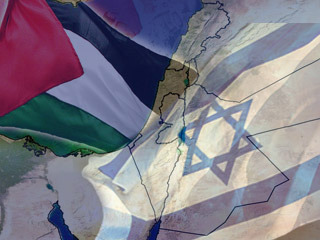 I posted this on Global Post. JERUSALEM — There’s an old Arab aphorism: “A man with a plan takes action; a man with two plans gets confused.” Apply that to the Israelis and to the Palestinians, and the nonsensical sequence of recent events in the Middle East starts to fall into a comprehensible pattern.
I posted this on Global Post. JERUSALEM — There’s an old Arab aphorism: “A man with a plan takes action; a man with two plans gets confused.” Apply that to the Israelis and to the Palestinians, and the nonsensical sequence of recent events in the Middle East starts to fall into a comprehensible pattern.It’s not a pleasant pattern, because it leads to war.
First, before we get to the fireworks, let’s recap all the nonsense.
The Palestinians refused to talk to the Israelis from December 2008, when a relatively centrist Israeli government made a peace offer the Palestinians rejected. Since then, small economic reforms and big U.S. security aid have made life in the West Bank fairly free of violence. Better, for sure, than life in Gaza, which is still a mess more than a year after the Hamas-Israel war there.
Israelis elected a center-right-dominated parliament a year ago, and Benjamin Netanyahu formed a rightist cabinet. He refused to halt building in Israel’s West Bank settlements, as President Barack Obama demanded. Even when forced by Washington to put a transparently fake freeze on construction he declined to include East Jerusalem.
The Palestinians wouldn’t restart direct peace talks until there was a freeze on the Israeli neighborhoods of East Jerusalem. So the Americans eventually persuaded them to have indirect talks. Without much enthusiasm, the Palestinians agreed.
Why no enthusiasm? Leading Palestinians, including chief negotiator Saeb Erekat, had already started to talk about a new failed round of talks leading quite simply to a “one-state solution.” That means, no division of the land, just a single state in what’s now Israel, the West Bank and Gaza. One adult, one vote. Soon enough, of course, that means no Jewish majority and the end of Israel as a Jewish state.
Meanwhile, Israel largely escaped the financial crisis of the last two years and its citizens spend little time fretting about the Palestinians. In Tel Aviv, the discovery of old bones by workers building an underground emergency room for a hospital led last month to an attempt by ultra-religious politicians to block the construction, and protests by locals who cried out against religious coercion.
No such mass protests against continued building in the settlements. That proceeds, even to the extent that during the last month announcements of new construction in East Jerusalem have caused a major crisis in relations with Washington. In one case, the planned building of a mere 20 apartments in an Arab neighborhood of East Jerusalem forced Obama to take time out of his undoubtedly busy day to discuss it with Netanyahu.
There’s more nonsense, but let this much suffice for now.
Back to the Arab aphorism. Who has a plan, and who’s confused?
It’s clear that most Israelis and most Palestinians are living in denial — a kind of confusion, because it takes the illusion of current calm for a sustainable and welcome period of peace.
Israelis know the settlements can’t go alongside a two-state solution, but they don’t choose one or the other.
Palestinians know that the way to stop the settlements eating up the hilltops around their towns is to strike a deal now and rule their own state, but they won’t do it so long as life is relatively good and the international pressure is all on Israel. Leaders of Fatah and Hamas have called for a “third intifada” several times in the last four months — not for renewed talks, only for renewed violence. But a mere handful of kids came out to throw rocks and Molotov cocktails.
With no sense of urgency on either side, Western diplomats shake their heads and try to nudge the two nations to the negotiating table. It’s time to realize that neither side wants talks.
While most Israelis live in denial, a sizeable minority pushes for more building in the West Bank and East Jerusalem. They’re not building so that they can later give up that land and see all the money they’ve pumped into their real estate wasted. The purpose is to make the West Bank inseparable from Israel. To kill the two-state solution.
In that scenario, either the Palestinians agree to be second-class inhabitants of the area -- fat chance -- or they leave. Well, with a little nudge.
On the Palestinian side, negotiations seem unlikely to lead to the satisfaction of every single demand. So the one-state solution starts to look good to them, too. However, second-class citizenship isn’t an option, and neither is leaving.
That’s the collision course Western diplomats refuse to countenance. When envoys talk about getting the “peace process on track,” it sounds good. But that process has been trucking along since the early 1990s. Peace has been getting further away. The “process” allows for a sense of activity, while all the time events — settlement construction, terror attacks — make it harder to draw lines on a map and make the populations secure.
It’s time to figure out a new diplomatic strategy to deal with the Israelis and Palestinians. One that’s based on the assumption that, in the longterm, they’re expecting war.
Published on April 06, 2010 02:02
•
Tags:
arab, barack-obama, benjamin-netanyahu, conflict, crime-fiction, east-jerusalem, fatah, gaza, global-post, hamas, intifada, islam, israel, israelis, jerusalem, jews, journalism, middle-east, palestine, palestinians, settlements, tel-aviv, war
What do YOU think of me?
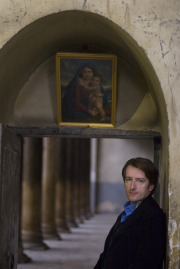 A friend of mine was lunching with a Scandinavian author a while back. At one point, the writer joked: “But that’s enough of me talking about myself. What do YOU think of me?”
A friend of mine was lunching with a Scandinavian author a while back. At one point, the writer joked: “But that’s enough of me talking about myself. What do YOU think of me?”Unlike that writer, I don’t care what you think of me. Don’t be offended – I don’t care what I think about other people, either. The more I write, the more I realize that I’m interested in myself alone.
That, I believe, is the necessary focus of all art – even if its final aim is to turn that inward look out toward the reader, the viewer, the listener. Art is flawed unless it focuses on the artist’s relationship with the world around him – through the narrator’s voice, in the case of a novelist.
I’ve been poring over this for a while, but it came to the fore last week after I spoke to an American group visiting Jerusalem. Mimi Schwartz, a writer of creative nonfiction, approached me after the event. She was kind enough to say that my long tenure here in Jerusalem – next month it’ll be 14 years – gave me a valuable perspective on the place. She suggested I write a memoir, in between my crime novels, because it would allow me “to bear witness.”
When I think of writing nonfiction about my experiences here, I tend to view the likely outcome as being David Sedaris-style essays telling amusing tales or a one-man-show in a similar vein. I don’t think that’s quite what Mimi had in mind. (She seemed like a lady of broad curiosity. I don’t think she’d be upset.)
I don’t want to “bear witness.” What I’ve witnessed in Jerusalem, Nablus, Tel Aviv, Gaza – none of it seems to have any value, frankly, unless I can tell you how I feel about it. Otherwise it’s just a litany of body parts and angry people and failed politics and disappointing lives.
I don’t mean to suggest that art has to be uplifting. But it has to open reality out, spread it wider than the small scope of journalism. That’s why much photography often seems to me to be the sneaky little charlatan of the arts world, because it’s so frequently done for the eye-catching cool beloved of ad-men or with an empty-eyed blandness.
By the same token, art may descend too far beyond the personal. The solipsistic crap that passes for contemporary art is the flipside of the banality of the mediocre photographer.
So all (bearable) art is, in a sense, bearing witness. Because it must be based firmly in something real. If it isn’t based in something real, then it doesn’t come as a reaction on the part of the artist to a real experience – and there’ll be something about it that tips the reader or viewer to the fact that the artist is lieing about or obscuring himself.
My series of four crime novels about Omar Yussef, a Palestinian detective, obviously have an element based in reality, because Omar is a way for me to unfold the scenes and emotions through which I’ve lived these past 14 years. But my next novel, which is to be about the death of Mozart, will just as surely be based in my experience of how people react to a loss and the dirty reality that’s likely to lie behind a sudden death.
To do my bit of bearing witness, I plan to stick to fiction. It’s closer to the real truth.
Published on May 06, 2010 01:23
•
Tags:
art, contemporary-art, creative-nonfiction, crime-fiction, david-sedaris, fiction, gaza, israel, jerusalem, journalism, middle-east, mimi-schwartz, mozart, nablus, nonfiction, omar-yussef, palestine, palestinian-detective, photography, tel-aviv
Israeli settlements: frozen, still cooking
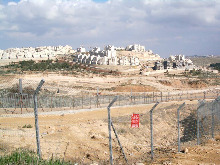 JERUSALEM — Palestinian negotiators said again this week they’d refuse to re-enter direct peace talks with Israel unless the current partial freeze on construction in Israeli settlements is extended when its term runs out in September.
JERUSALEM — Palestinian negotiators said again this week they’d refuse to re-enter direct peace talks with Israel unless the current partial freeze on construction in Israeli settlements is extended when its term runs out in September.But as a report released this week by the Israeli human-rights organization B’Tselem reveals, a real settlement freeze would have to be a very, very big chill.
B’Tselem’s report, called “By Hook or By Crook: Israeli Settlement Policy in the West Bank,” documents the massive scope of Israel’s settlement operation. It says that hundreds of millions of dollars are being paid to settlers, real estate developers and settlement municipalities as incentives to expand the settlements. It also highlights the manner in which every layer of Israeli bureaucracy continues to be involved in an expansion project that successive Israeli governments have pledged in international forums to halt.
For the human rights group, the issue is not political. Jessica Montell, B’Tselem’s executive director, said that the inequality of life in the West Bank — rather good if you’re an Israeli and pretty bad if you’re Palestinian — is the most objectionable upshot of the settlements, which she adds are illegal under international law.
“In the West Bank, your rights are based on your nationality,” she said.
Read the rest of this post on my blog The Man of Twists and Turns.
Published on July 23, 2010 22:03
•
Tags:
b-tselem, benjamin-netanyahu, east-jerusalem, george-w-bush, human-rights, israel, israeli, jessica-montell, middle-east, palestine, palestinian, road-map, settlement-freeze, settlements, tel-aviv, west-bank
Israeli pick-up artist protests
 The Jewish holiday of Hanukkah ended last week, bringing to a close an apparently great opportunity for sexual conquest.
The Jewish holiday of Hanukkah ended last week, bringing to a close an apparently great opportunity for sexual conquest.The Center for the Art of Seduction, a Tel Aviv business which runs courses to help men succeed with women (“Do you want to get every girl that you want?”), posted a video earlier this month in which one of its instructors advises men how to make the Jewish holiday a time of fun and frolics with the ladies.
“Ask her, ‘Have you tasted the new donuts this year?’” suggests Tal Lifshitz, posing beside a plate of the jelly donuts traditionally consumed on the holiday and a menorah with its candles burning. “‘What’s your favorite flavor of donuts?’”
This is the kind of approach which, according to the center’s website, will enable you “to have a lot of sex while you’re looking for your special one.”
It also might get you into trouble and, this being Israel, bring out the protesters.
A group of about 150 angry demonstrators descended on the center’s Tel Aviv office Thursday night, accusing the center of training men to coerce women into sex. The protesters carried signs saying, “It could happen to anyone” — “It” being rape.
The protest came after three female students at the University of Haifa filed a complaint with the police against the center and one of its graduates. The women allege rape, incitement to violence and solicitation, although none of them has been a direct victim.
The charges relate to a 4-year-old post on the center’s website by a man who claimed to have had sex with a Czech medical student against her will. On the site, the accusers say, one of the center’s organizers used an alias to commend the tactics.
That case has been making the rounds on Israeli internet forums for months, leading to the charges against the center.
The center is the Israeli outcropping of a men’s seduction subculture that has flourished on the internet since its first appearance in chat rooms during the mid-1990s. It was popularized in 2005 with the publication of Neil Strauss’ bestselling expose, “The Game: Penetrating the Secret Society of Pick-up Artists.”
Strauss detailed many of the techniques of the so-called “PUAs,” or pick-up artists, which are based around the idea that “supplication” — buying dinner, saying nice things — gets men nowhere with women. Rather, a man should employ a subtle put-down, for example.
A search for so-called “Lairs,” online sites for local PUAs to converse and swap information, reveals numerous locations where such groups operate from Salt Lake City to Singapore.
Officials at the Tel Aviv center maintain that their techniques are intended to promote romantic relations and to enable men who otherwise wouldn’t be able to form relationships with women to find happiness.
The donut-recommending Lifshitz, for example, describes himself on the center’s website as enjoying “incredible success with women,” though he might be described as something of a schlub, with the kind of goatee worn by men attempting to disguise the pudginess of their face.
The center opened six years ago and has run courses for 8,000 men. One of its graduates, a 35-year-old named Gal, recounted that an instructor told him the center was “going to make a revolution in Israel so that men will behave like men and women will learn to respect men.”
The center’s website, meanwhile, includes a cartoon of a woman displaying her cleavage and sucking suggestively on a strawberry. The protesters, no doubt, would argue that respect has to go both ways.
Read more post on my blog
Published on December 20, 2010 06:19
•
Tags:
center-for-the-art-of-seduction, hannukah, israel, israelis, jews, neil-strauss, pick-up-artists, protests, sex, tel-aviv, the-game
Israel's president is no angel
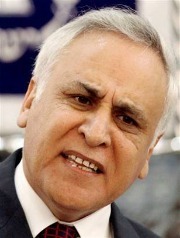 When the residents of Kiryat Malakhi, the southern Israeli town whose name means “City of Angels,” picked Moshe Katsav as the youngest-ever mayor in the country’s history in 1970, he was 24. For decades he was the town’s symbol, an immigrant born in Iran who made it to the top of the establishment and was elected Israel's president in 2000.
When the residents of Kiryat Malakhi, the southern Israeli town whose name means “City of Angels,” picked Moshe Katsav as the youngest-ever mayor in the country’s history in 1970, he was 24. For decades he was the town’s symbol, an immigrant born in Iran who made it to the top of the establishment and was elected Israel's president in 2000.Now it has been proven that they picked the wrong man.
Far from being an angel, Katsav stands convicted of two counts of rape and of other counts of sexual harassment and obstruction of justice. Tel Aviv District Court judges said Thursday that Katsav had “excelled in manipulation and withholding information” during his trial.
Katsav was found guilty of twice raping a woman who worked for him when he was tourism minister a decade and a half ago. He was also convicted of sexually abusing and harassing two women who worked for him at the president’s residence.
Beyond the ugliness of his crimes, the hubris of Katsav’s case is immense. It was Katsav who first drew public attention to his sexual misdeeds — to which other politicians had long turned a blind eye — by complaining five years ago to the attorney general that he was being blackmailed by one of the women he now turns out to have abused.
Subsequently, he was offered a controversially lenient plea bargain, according to which he would have escaped prison and accepted conviction on lesser charges than rape. Just as the deal was due to be signed, Katsav rejected it, claiming he would prove his innocence in court. It now appears he had been seduced by his own lies.
When the accusations were first leveled at him, Katsav ranted at length against the media in a rage-filled press conference at the presidential residence. He railed that he was the “victim of a lynching” by the media and the judiciary, because he was an upstart from a poor town whose origins lay in the Muslim world, not among the typical Israeli elite descended from European Jews. This was in spite of the fact that the attorney general who indicted Katsav was born in Tunisia.
The Tel Aviv judges noted the 65-year-old former president’s tactical error, when they highlighted the new evidence that had arisen since the rejection of the plea bargain — evidence which made his conviction all the more certain. Had Katsav accepted the plea deal, he would by now have been a candidate for prime minister. Instead, he could face up to 16 years in jail.
Katsav’s lawyers say he’ll appeal and, in the manner of the long court case so far, unnamed friends have appeared in the Israeli press to say how depressed he is that the court didn’t accept his explanation of events. Some described him as too upset to leave his house for his local synagogue on Friday.
Outside the court, where his father had been required to surrender his passport, Katsav’s son Boaz rejected the verdict: “We will continue to walk with our heads high, so all the nation throughout its generations, with God’s help, will know that father, the eighth president of the State of Israel, is innocent.”
Read the rest of this post on my blog The Man of Twists and Turns.
Published on January 01, 2011 00:43
•
Tags:
benjamin-netanyahu, crime, israel, israeli-president, israelis, jews, kiryat-malakhi, middle-east, moshe-katsav, rape, tel-aviv



